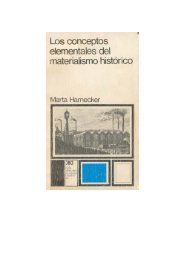Eric Hobsbawn – Historia del siglo XX - UHP
Eric Hobsbawn – Historia del siglo XX - UHP
Eric Hobsbawn – Historia del siglo XX - UHP
Create successful ePaper yourself
Turn your PDF publications into a flip-book with our unique Google optimized e-Paper software.
BIBLIOGRAFÍA 593<br />
Weber, Hermann, Die Wandlung des deutschen Kommunismus: Die Stalinisierung<br />
der KPD in der Weimarer Republik, Frankfurt, 1969, 2 vols.<br />
Weinberg, Steven, «The Search for Unity: Notes for a History of Quantum Field<br />
Theory», Daedalus (otoño de 1977). —, «Einstein and Spacetime Then and Now»,<br />
Bulletin American Academy of Arts and<br />
Sciences, <strong>XX</strong>XIII (2 de noviembre de 1979). Weisskopf, V., «What Is Quantum<br />
Mechanics?», Bulletin American Academy of Arts<br />
and Sciences, <strong>XX</strong>XIII (abril de 1980). Wiener, Jon, Come Together: John Lennon in his<br />
Time, Nueva York, 1984. Wildavsky, Aaron, y Karl Dake, «Theories of Risk Perception: Who<br />
Fears What and<br />
Why?», Daedalus, vol. 119, n. ° 4 (otoño de 1990), pp. 41-60. Willett, John, The New<br />
Sobrietv: Art and Politics in the Weimar Period, Londres,<br />
1978. Wilson, E. O., «Biology and the Social Sciences», Daedalus, vol. 106, n. ° 4 (otoño<br />
de 1977), pp. 127-140. Winter, Jay, War and the British People, Londres, 1986.<br />
«Woman», 1964 = «The Woman in America», Daedalus (1964). The World Almanack, Nueva<br />
York, 1964, 1993. The World Bank Atlas 1990, Washington, 1990. World Development =<br />
Banco Mundial, World Development Report, Nueva York,<br />
anual. World Economíc Survey, 1989 = UN Dept of International Economic and Social<br />
Affairs, World Economic Survey 1989: Current Trends and Policies in the World<br />
Economy, Nueva York, 1989. World Labour, 1989 = International Labour Office (ILO),<br />
World Labour Report<br />
1989, Ginebra, 1989. World Resources, 1986 = A Report by the World Resources Institute and<br />
the International Institute for Environment and Development, Nueva York, 1986. World<br />
Tables, 1991 = Banco Mundial, World Tables 1991, Baltimore y Washington,<br />
1991. World's Women, véase UN World's Women. Zetkin, Clara, «Reminiscences of<br />
Lenin», en They Knew Lenin: Reminiscences of<br />
Foreign Contemporaries, Moscú, 1968. Ziebura, Gilbert, World Economy and World<br />
Politics 1924-1931: From Reconstruc-<br />
tion to Collapse, Oxford, Nueva York y Munich, 1990. Zinoviev, Aleksandr, The Yawning<br />
Heights, Harmondsworth, 1979.<br />
OTRAS LECTURAS<br />
Los lectores no historiadores que deseen ampliar conocimientos encontrarán aquí algunas<br />
sugerencias de lecturas.<br />
Los acontecimientos básicos de la historia <strong>del</strong> <strong>siglo</strong> <strong>XX</strong> podrán hallarse en un buen manual<br />
universitario, como el de R. R. Palmer y Joel Colton, A History of the Modern World (1983 6 o<br />
ediciones posteriores), que incluye excelentes bibliografías. Existen buenos estudios generales,<br />
en un solo volumen, de algunas regiones y continentes, pero no de otros. Ira Lapidus, A<br />
History of Islamic Societies (1988), Jack Gray, Rebellions and Revolutions: China from the<br />
1800s to the 1980s (1990), Roland Oliver y Anthony Atmore, Africa since 1800 (1981), y<br />
James Joll, Europe since 1870 (la última ed. ) son útiles. Peter Calvocoressi, World Politics<br />
since 1945 (1991") es muy completo para este período. Debe leerse como complemento de<br />
Paul Kennedy, The Rise and Fall of the Great Powers (1987), y Charles Tilly, Coercion,<br />
Capital and European States AD 900-1990 (1990). También obra de un solo volumen, la de<br />
W. W. Rostow, The World Economy: History and Prospect (1978), aunque discutible y lejos<br />
de ser un libro de cabecera, proporciona un gran caudal de información. Mucho más<br />
adecuados son los libros de Paul Bairoch, The Economic Development of the Third World<br />
since 1900 (1975), y David Landes, The Unbound Prometheus (1969) sobre el desarrollo de la<br />
tecnología y de la industria.<br />
En la lista bibliográfica se incluyen algunas obras de referencia. Entre los compendios<br />
estadísticos destacan Historical Statistics of the United States: Colonial Times to 1970 (1975,<br />
3 vols. ), B. R. Mitchells, European Historical Statistics (1980). su International Historical<br />
Statistics (1986), y P. Flora, State, Economy and Society in Western Europe 1815-1975 (1983,<br />
2 vols. ). El Biographical Dictionary de Chambers es muy amplio y adecuado. Para aquellos a<br />
quienes les gusten los mapas, pueden hallar información en los imaginativos Times Atlas of<br />
World History (1978), los mapas ideados brillantemente por Michael Kidron y Ronald Segal,<br />
The New State of the World Atlas (1991 4 ), y los —económicos y sociales— World Bank Atlas,<br />
anuales desde 1968. Entre las numerosas recopilaciones de otros mapas, véanse Andrew<br />
Wheatcroft, The World Atlas of Revolution (1983), Colin McEvedy y R. Jones, An Atlas of<br />
World Population History (ed. 1982), y Martin Gilbert, Atlas of the Holocaust (1972).<br />
Los mapas son quizá más útiles para el estudio histórico de regiones concretas; entre ellos,<br />
G. Blake, John Dewdney y Jonathan Mitchell, The Cambridge Atlas of the Middle East and<br />
North Africa (1987), Joseph E. Schwarzberg, A Historical Atlas of South Asia (1978), J. F.<br />
Adeadjayí y M. Crowder, Historical Atlas of Africa (1985) y Martin Gilbert, Russian History<br />
Atlas (ed. 1993). Existen buenas historias, de varios





![Vandenberg - El secreto de los oráculos [pdf] - UHP](https://img.yumpu.com/13637083/1/184x260/vandenberg-el-secreto-de-los-oraculos-pdf-uhp.jpg?quality=85)